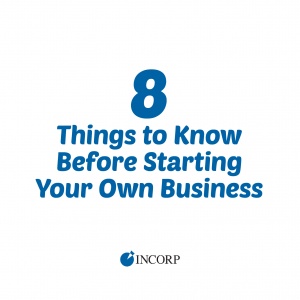Things to Know Before You Start Your Own Business
Starting a business the right way requires a tremendous commitment of money, time, passion, and energy. Besides knowing your product or service, you need to have enough business know-how to turn your dreams into reality. Here are eight of the most important:
-
Know the Numbers
Anyone can dream about starting a business, but at some point, you need to wake up and smell the reality. The best way to see if your idea will actually make money is to prepare a comprehensive business plan. It will involve a lot of time-consuming research, but it's absolutely necessary. You'll need to present a business plan to your bank to apply for financing, but even if you plan to finance the business with existing funds, putting everything down on paper will give you a clear picture of whether your proposed business is practical. A good business plan contains a wealth of details, including your plan to finance the company, start-up costs, monthly operating expenses, expected revenues, how you intend to market your product or service, how many employees you'll need (and what payroll costs will be), etc. It may take you a while to start generating sales, so be conservative with your income projections. What's the worst-case scenario? If it happens, can you still stay in business? The SBA has an online tool to help you draft a business plan.
-
Know What You Don't Know
Before making the leap, line up a team of experts with the knowledge and experience you don't yet have. Show them your business plan, get their feedback, and then listen carefully to their advice. At the very least, your team should consist of an attorney, a CPA, a business banker, an insurance agent, and an expert on corporate structures. You might also contact your local chapter of SCORE, a non-profit resource partner with the U.S. Small Business Administration. SCORE provides free mentoring services to entrepreneurs and small business owners, presents business workshops and seminars, and can provide help in drawing up your business plan.
-
Know Your Market
Launching a business without knowing your market is like driving down a busy street while blindfolded. Invest in some research to find out about your competitors, your pool of possible customers, the outlook for the local economy, etc. There are many sources of information, including federal, state, and local governments and economic development agencies. The SBA has a free online tool called SizeUp that can help small business owners benchmark their company against competitors, map their customers, competitors, and suppliers, and locate the best places to advertise. Knowing your potential customers can help you make decisions on how to market to them. For example, if you're targeting Millennials, you might consider using mobile marketing to reach them on their ever-present digital devices.
-
Know Your Pricing Strategy
After you have completed your business plan, you'll know your fixed overhead costs, and you can then add in the costs involved in producing, marketing, and distributing each unit of your product. Adding these together will give you a break-even point. Since you're not in business to break even, you also need to add a profit margin. The resulting price should be low enough to compare favorably with the competition while providing you the income you need. If it isn't, you need to revisit your business plan.
-
Know Which Business Entity Will Work Best For You
A corporation, LLC, or some other corporate entity may help separate your personal assets from company assets in the event your business faces financial or legal challenges. Consult an expert who knows the laws in your locality and can advise you on the best business entity for your new company.
-
Know Your Team
Choosing the right management team and employees is vital to your success. Before committing to a partnership or hiring an individual, make sure they are the right fit. A good team consists of people with different strengths and weaknesses who complement each other to make up a strong unit. For example, if you are a "big-picture" visionary who doesn't pay much attention to day-to-day details, you may need a detail-oriented person to ensure your business runs smoothly.
-
Know How to Protect Yourself
You wouldn't open a business without insurance protection, and it's also important to protect yourself against fraud and identity theft. Employees and subcontractors may find ways to eat into your profits by embezzling or outright theft. Click here for an article on protecting yourself from internal fraud. Computer hackers and identity thieves also target businesses, looking for ways to steal money and information, and new scams pop up every day. Get informed about fraud and scams so you can be prepared to fight them.
-
Know What to do in Case of Disaster
The only predictable thing about business is that the unexpected is certain to happen, and it may not always be good. Before you open your doors, have a plan in place to help you prepare for emergencies, whether natural like floods or fires, or man-made like robbery or computer hacking. Here are two articles from Incorp with resources that can help you be better prepared: Is My Business Prepared for a Natural Disaster? and When Disasters Happen Part 2: Unnatural and Man-made Catastrophes.
Once you have the information you need, you'll be well on your way to opening the doors of your new business.
Stay in the know!
Join our newsletter for special offers.

